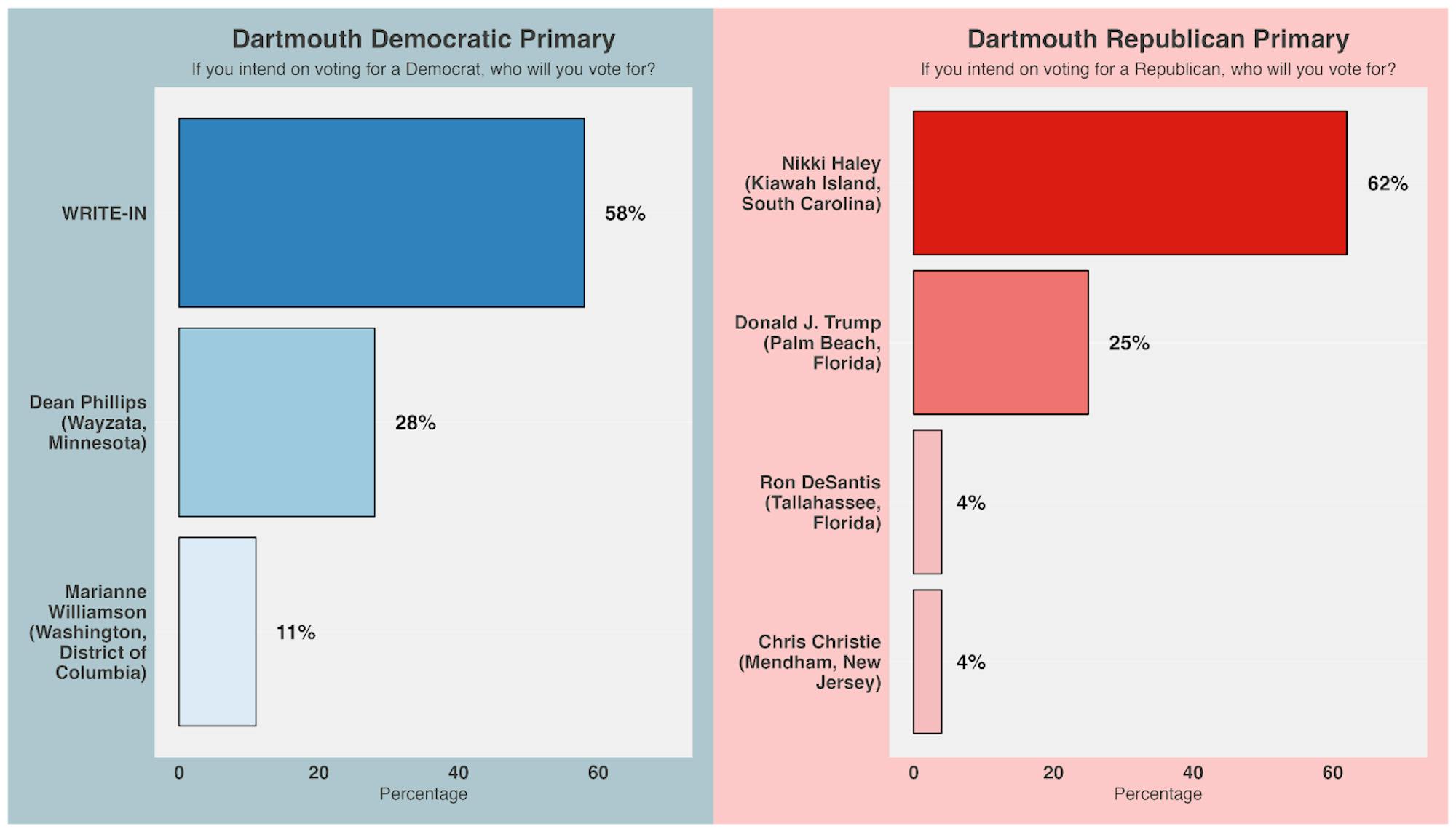On the eve of the 2024 New Hampshire presidential primary, The Dartmouth polled students on their voting preferences.
Dartmouth students demonstrate high levels of political activity.
Dartmouth students are eager to participate in the first-in-the-nation elections in New Hampshire, with 96% of respondents indicating that they are able to vote, 85% of which plan to participate in the primary process. However, not all students are opting to vote in New Hampshire: 65% of students are registered to vote in New Hampshire, while 35% are mailing their votes to other states. For students who indicated that they would vote via an absentee ballot, 47% come from states that typically vote for Democratic (blue) candidates, 25% are from states that typically vote Republican (red), and 28% are from swing (purple) states.
While 48% of the respondents associate with the Democratic party, 15% associate with the Republican party and 34% don’t associate with either party, many students are willing to vote for a candidate from the opposing party. Nearly a third of Dartmouth students (32%) are open to considering candidates on the other side of the aisle, with 62% of students voting along party lines.
The majority of Dartmouth’s student Democrats express their support for incumbent Joe Biden.
The majority (58%) of Dartmouth students who plan to vote in the Democratic primary opted for write-ins, 96% of which expressed support for incumbent President Joe Biden. President Biden did not register as a candidate for the New Hampshire primary following the Democratic National Convention’s decision to make South Carolina their first official primary of the election cycle. 28% of the remaining democrats backed Minnesota Congressman Dean Phillips, and another 11% chose self-help author Marianne Williamson as their first option. Additionally, 2% of students were persuaded by Vermin Supreme, a perennial candidate who has run in several presidential primaries. For the second choice of student democrats, Phillips garnered the support of 38% of votes, Williamson’s support rose marginally to 15%, and Paperboy Love Prince received 8% of the vote. 26% of students chose to write in candidates, and 70% of these write-ins support Biden. This data shows a distinct pattern among Dartmouth students who lean Democratic, indicating strong support for the incumbent President. However, Dean Philips, who recently visited the Hanover Inn on Jan. 18, seems to be a popular option for students as well.
Nikki Haley wins the support of Dartmouth’s Republican students.
There is a clear choice among Dartmouth students who vote Republican, with Nikki Haley garnering the greatest support. Haley led the Republican vote in Dartmouth with 62% of the first-choice vote, while Donald Trump was in second place with 25%. Although they have officially suspended their presidential campaigns, Ron DeSantis and Chris Christie both received 4% of the vote. Support for the other contenders within the Republican primary was merely negligible.
The spread for Dartmouth’s second-choice Republican candidates was more evenly distributed: while Nikky Haley got 21%, Vivek Ramaswamy, who canceled his visit to campus after dropping out of the Republican race, earned 15% of the vote. Christie and Trump each received 15% of votes, and DeSantis polled in last with 12% of student votes.
When Dartmouth students were asked to choose a Republican nominee who has since withdrawn from the presidential race, a sizable majority voiced their preference for former New Jersey Governor Chris Christie. 64% of these students endorsed Christie, demonstrating a clear inclination toward his campaign and message against Donald Trump. Ron DeSantis came next, receiving a moderate 17% of support from the students. Asa Hutchinson and Vivek Ramaswamy polled comparatively lower, with 11% and 8%, respectively.
The degree of support among Dartmouth students for their selected candidates from both the Republican and Democratic primaries varies widely. Strong support for their chosen candidate was demonstrated by a significant 34% of voters, demonstrating a strong sense of conviction in their decision. Furthermore, only 29% of the students supported their candidate to a moderate extent, indicating some hesitancy or ambiguity about their choice. A smaller percentage, 13%, indicated mild support for their candidate. Remarkably, more than 24% of students are not voting for a candidate because they strongly support them or agree with their beliefs, but rather because they believe they are the “least bad” of all the options.

We also polled Dartmouth students to gauge their views on South Carolina serving as the first state to have a presidential primary for both parties. The results indicate resounding disapproval. Just 6% of respondents thought South Carolina should host the first primary for both parties, indicating little support for altering the custom of New Hampshire hosting the first primary. 59% of students opposed South Carolina serving as the first primary state. Furthermore, a sizable 35% of students were unsure, which could be attributed to a lack of conviction or insufficient knowledge to make a decision.
Methodology Notes:
From Sunday, Jan. 21 to Monday, Jan. 22, The Dartmouth fielded an online survey of the Dartmouth student body on their views of the 2024 New Hampshire presidential primary election. The survey was sent out to 4,447 undergraduates through their school email addresses. 174 responses were recorded, resulting in a 3.9% response rate. Survey results have a margin of error +/- 4.2%.




